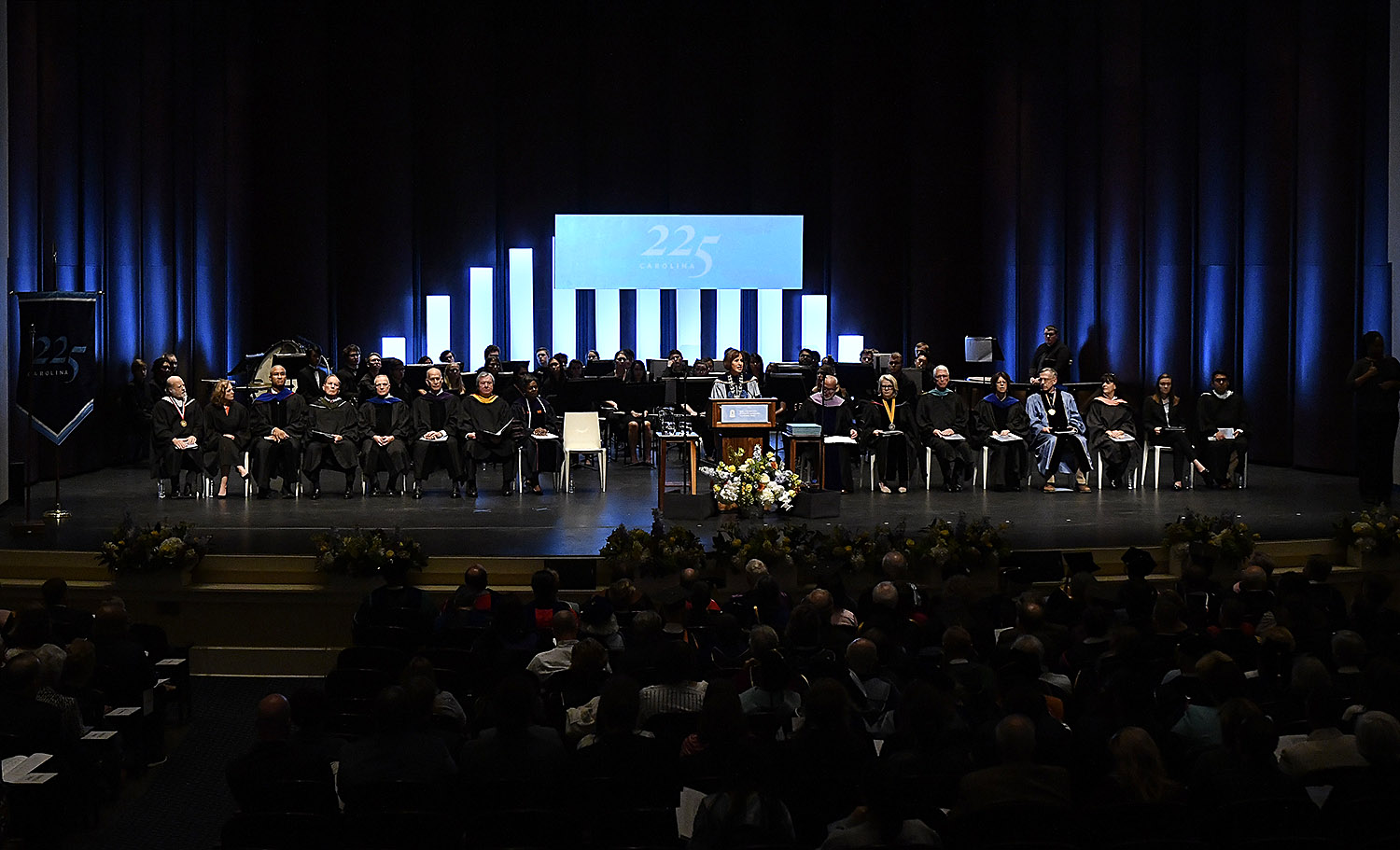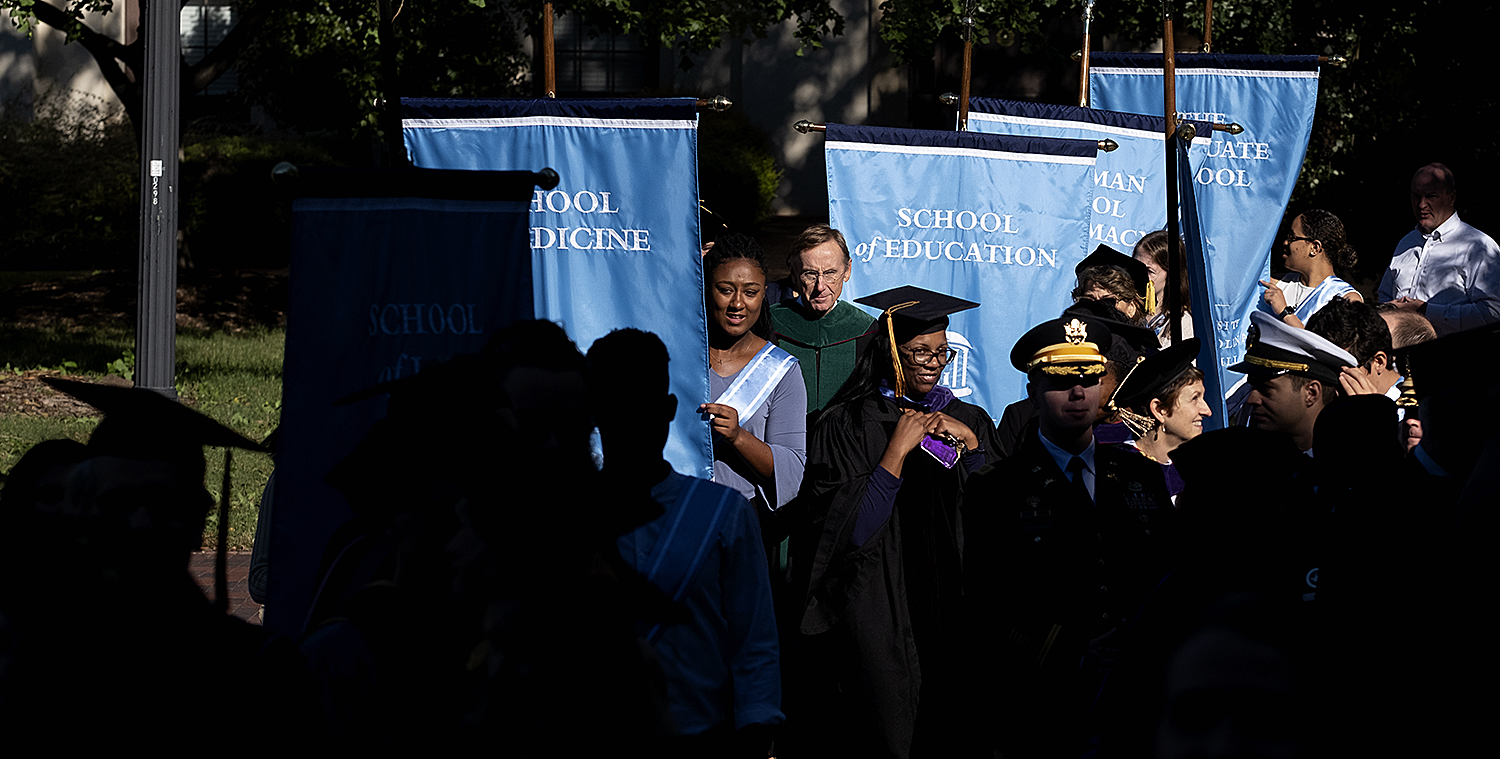University Day Includes Apology for Role in Slavery
Posted on Oct. 12, 2018
Chancellor Carol L. Folt presided over the Oct. 12 University Day ceremony at Memorial Hall. (Photo by Grant Halverson ’93)
Chancellor Carol L. Folt used the occasion of the celebration of Carolina’s 225th birthday to acknowledge the University’s complicated racial past.
In her welcome remarks, Folt apologized for UNC’s participation in the practice of slavery. The University was built and sustained by slaves, and Folt is the first Carolina chancellor to issue an apology.
“As chancellor of The University of North Carolina at Chapel Hill, I offer our University’s deepest apology for the profound injustices of slavery, our full acknowledgment of the strength of enslaved peoples in the face of their suffering, and our respect and indebtedness to them,” Folt said. “I reaffirm our University’s commitment to facing squarely and working to right the wrongs of history so they are never again inflicted.”
She noted that as the nation’s oldest public university, Carolina has experienced U.S. history from the start.
“Our unique legacy demands that we continue to reconcile our past with our present and future and be the diverse and just community that is fitting for America’s first public university. Our apology must lead to purposeful action, and it has to build upon the great efforts and sacrifices of so many across the years who fought so hard for much of what we value about Carolina today.”

The Oct. 12 University Day ceremony marks the laying of the cornerstone of Old East. (Photo by Grant Halverson ’93)
Folt presided over the Oct. 12 University Day ceremony at Memorial Hall, which marks the laying of the cornerstone of Old East, the nation’s first public university building, in 1793. Folt, in her fifth year as chancellor, also served as one of the keynote speakers, along with history professor James Leloudis ’77 and Felicia Washington ’87, Carolina’s vice chancellor for workforce strategy, equity and engagement.
In his remarks as a co-chair of the chancellor’s task force on the University’s history, Leloudis detailed the University’s newest efforts to install signs and educational markers in McCorkle Place, the historic heart of campus and the site of Carolina’s first buildings. Those plans include:
• Signs and threshold markers at the quad entrances that will mark the birthplace of American public higher education and acknowledge the indigenous people who “were the first stewards of this land, and whose descendants work, study and teach here today”;
• A marker near the Unsung Founders Memorial that “will express the University’s deep contrition for its role in the injustices of slavery and invite visitors to join us in researching and recovering the full humanity of the enslaved men and women who built so much of the early University and sustained it”; and
• Repair and renovation of the Unsung Founders Memorial site that “will create a more respectful, contemplative space of the sort that the class of 2002 imagined when they presented the sculpture as their class gift.”
Leloudis said once there is a plan for the Confederate monument’s location, extensive research already conducted will help “inform an exhibit and other educational materials to teach the history of the monument and the era of white supremacy in which it was erected.”
Five alumni received Distinguished Alumna and Alumnus Awards:
• Donald A. Baer ’76, CEO of Burson-Marsteller;
• Robert L. Bryant ’79 (PhD), math professor at Duke University;
• Vaughn D. Bryson ’60, retired CEO of Eli Lilly;
• Peter B. Henry ’91, dean emeritus of NYU’s business school; and
• Singer-songwriter Tift Merritt ’00.
Bland Simpson ’70, Kenan Distinguished Professor of English and creative writing, received the Edward Kidder Graham Faculty Service Award.
